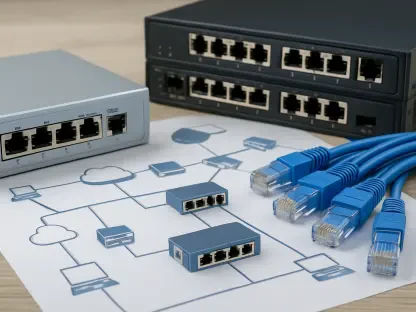In a move aimed at empowering Managed Service Providers (MSPs) with greater flexibility and enhanced capabilities, HPE Aruba Networking Central has introduced new deployment options and features. These enhancements include virtual private cloud (VPC) and on-premises deployment options, designed to support MSPs as they deliver more flexible and efficient services to various industries such as retail, financial services, and government sectors. The new deployment options aim to fill a market gap, addressing specific regional, local, regulatory, and sovereign-driven network management needs of larger organizations.
Expanded Deployment Options
Diverse Choices for MSPs
Managed Service Providers now have several deployment models at their disposal, courtesy of HPE Aruba Networking Central. The recently introduced virtual private cloud (VPC), combined with the existing options of cloud-delivered SaaS, on-premises, and Network-as-a-Service (NaaS) models, provides MSPs with a range of choices. This diversity in deployment options seeks to enhance flexibility and adaptability, thereby meeting the specific needs of their clientele. Particularly noteworthy is the support for government agencies that require dedicated, FIPS 140-2 certified server hardware to comply with stringent security standards.
The introduction of these varied deployment models signifies Aruba’s understanding of MSPs’ need to cater to different industry requirements effectively. By offering these options, MSPs can deliver tailored solutions that align with regulatory and security demands, whether it be for cloud agility through VPC or localized control via on-premises deployments. As a result, these enhancements not only ensure compliance with industry standards but also allow MSPs to provide robust and secure network management solutions to their customers.
Fit for Various Industries
The newly introduced deployment options are designed to meet the diverse needs of multiple industries, such as retail, financial services, and government sectors. With the availability of virtual private cloud (VPC) and on-premises deployments, HPE Aruba Networking Central empowers organizations to maintain stringent data security and comply with regulatory requirements effectively. This ability to maintain high standards of data protection and conformity with regulations makes the platform highly suitable for industries that deal with sensitive information, such as financial institutions or government entities.
The flexibility offered by these deployment options means MSPs can now accommodate clients with unique network management needs more effectively. For instance, in the retail sector, secure on-premises deployments can be used to handle sensitive customer data, while financial services and government agencies may rely on VPC environments for a balance of cloud agility and data control. The strategic nature of these enhancements allows organizations to select the deployment model that best aligns with their specific security and operational requirements.
Enhanced Features for Better Performance
AI-Powered Network Assistant
A pivotal enhancement to HPE Aruba Networking Central is the introduction of the always-on, AI-powered automated network assistant. This feature significantly extends the platform’s AIOps capabilities by providing real-time optimization alerts when performance issues arise. By leveraging artificial intelligence, the network assistant ensures operational stability and efficiency, which is critical for MSPs tasked with managing complex and dynamic network environments for their clients.
The automated network assistant operates continuously, identifying and addressing potential performance bottlenecks before they impact the end-user experience. This proactive approach to network management not only enhances reliability but also reduces downtime, ultimately leading to a more satisfied customer base. For MSPs, this means smoother operations and fewer manual interventions, allowing technical teams to focus on strategic initiatives rather than routine troubleshooting.
Improved Visibility and Speed
HPE Aruba Networking Central has invested heavily in expanding its global points of presence (PoP) locations dedicated to the cloud-delivered platform, resulting in faster and more efficient data routing. This improvement includes new dedicated instances in regions such as the U.S., Canada, the E.U., Middle East and Africa, Asia Pacific, and China. By ensuring local cloud availability, these enhancements contribute to better network performance and user experience, particularly in geographically diverse markets.
The expanded PoP locations mean that data travels shorter distances, reducing latency and enhancing speed. This is particularly beneficial for MSPs that manage clients with a global presence, as it ensures consistent performance regardless of the user’s physical location. Additionally, the presence of more PoP locations aligns with regulatory requirements that mandate data residency within specific regions, thus addressing compliance issues while optimizing network performance.
Strategic Moves and Market Impact
Customer and Partner Feedback
HPE’s product and engineering teams place significant emphasis on developing new features based on feedback from customers and partners. Recent investments in HPE Aruba Networking Central have focused on enhancing deployment flexibility, integrating AI-powered functionalities, and improving visibility into third-party network environments. These efforts reflect the company’s commitment to meeting the evolving needs of its user base, with most of these new capabilities now available on the platform, opening up new revenue opportunities for MSPs.
The focus on customer and partner feedback underscores HPE’s strategy to create a more responsive and dynamic product. By prioritizing user input, the company ensures that its offerings align with real-world requirements and deliver tangible value. This user-centric approach not only fosters stronger customer relationships but also positions HPE Aruba at the forefront of innovation in the network management space.
Addressing Challenges
While the new deployment options offer substantial benefits, they also introduce complexities that MSPs must navigate. Managing four distinct deployment models—SaaS, VPC, On-Premises, and NaaS—requires sales and technical teams to develop proficiency in each. This necessitates significant investment in training and resources to ensure that teams can effectively deploy and manage these varied infrastructures, particularly the on-premises and VPC environments.
The added complexity of managing multiple deployment models means that MSPs must be diligent in their approach. This includes understanding the nuances and best practices associated with each deployment model, developing expertise among team members, and creating standardized processes to streamline operations. While the initial investment in training and adaptation may be substantial, the long-term benefits of offering tailored, flexible solutions that meet diverse customer needs are likely to outweigh the challenges.
Analyst Insights
Competitive Edge
Anurag Agrawal, founder and chief global analyst at Techaisle, has highlighted HPE Aruba’s strategic enhancements as a significant step towards gaining a competitive edge. By offering deployment flexibility, bolstering AI capabilities, and enhancing observability, HPE Aruba aims to meet key market demands and position itself as a leader in network management solutions. Agrawal notes that while MSPs will need time to understand and integrate these new capabilities into their operations, the potential strategic advantages offered by these enhancements are considerable.
The strategic introduction of diverse deployment options and enhanced features is seen as a move that will allow HPE Aruba to differentiate itself in a competitive market. By addressing specific industry requirements and providing advanced solutions, HPE Aruba positions itself to capture a larger market share. The focus on AI-driven optimization and real-time observability are particularly noteworthy as they align with current trends towards automation and proactive network management.
Reflecting Commitment
Shelly Kramer, founder and principal analyst at Kramer&Co., has emphasized that the expanded features reflect HPE Aruba’s commitment to meeting diverse customer needs. Kramer pointed out that the inclusion of an always-on, AI-powered network assistant and enhanced observability are increasingly essential requirements in today’s market. The ability to monitor third-party devices from other vendors is a testament to HPE Aruba’s comprehensive approach to network management, configuration, and troubleshooting, marking its commitment to providing robust and flexible solutions through an annual subscription model.
Kramer lauds the platform’s ability to cater to varied customer requirements, noting that these strategic enhancements position HPE Aruba as a reliable partner for organizations seeking advanced network management solutions. The expanded capabilities not only improve the platform’s functionality but also reinforce HPE Aruba’s dedication to innovation and customer satisfaction. For MSPs, this means having access to a versatile tool that can address a wide range of network management challenges, ultimately leading to better service delivery and client satisfaction.
A Future of Enhanced Network Management
HPE Aruba Networking Central has rolled out new deployment options and features aimed at giving Managed Service Providers (MSPs) greater flexibility and enhanced capabilities. These updates include virtual private cloud (VPC) and on-premises deployment options. These innovations are designed to support MSPs in offering more adaptable and effective services across a range of industries, such as retail, financial services, and government sectors. By introducing these new deployment configurations, HPE Aruba Networking Central seeks to address a significant market gap. The focus is on meeting the specific regional, local, regulatory, and sovereign-driven network management needs of larger organizations. With these advancements, MSPs will be better equipped to handle diverse requirements, ensuring they can deliver high-quality, dependable network services across various sectors while meeting the stringent compliance standards these industries often demand.









